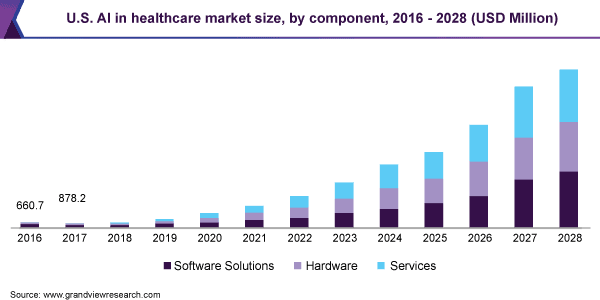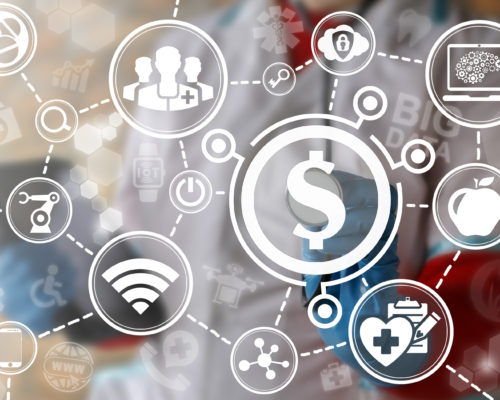AI has a significant role in the future of healthcare, and it’s already making a difference. The technology is being used for various purposes, including predictive modeling, digital health coaching, medical diagnoses, cancer detection, and more. The potential for AI making an even bigger impact on healthcare as we move into 2022 is endless.
Table of Contents
What is Artificial Intelligence?
Let’s start with the basics and define what artificial intelligence is. AI is a type of computer technology that allows machines to perform tasks that generally require the assistance of a physical person. It can potentially automate a wide range of processes and tasks such as data analysis, accounting, managerial work, engineering design, and so much more. AI can process visuals and sounds, make decisions, and even translate languages based on tons of collected data that helps it make those decisions and fuels artificial intelligence.
AI paired with machine learning has taken the industry by storm. Machine learning not only utilizes the amazing benefits of artificial intelligence, but the machines actually “learn” and change their processes. Data gathered throughout its processes is sorted and affects how the AI reacts to certain things. For example, if a certain combination of symptoms are always paired together, the AI narrows it down to a few specific diagnoses that the patient’s symptoms are signs of. As a result, it can help speed up the diagnosis process and continue improving itself without additional programming or updates.
What’s AI Already Doing in Healthcare?
Artificial Intelligence is already widely used across a variety of different areas of healthcare. Many of the world’s leading tech companies are currently working on a host of different AI-powered initiatives to improve patient care, diagnosis accuracy, and even treatment methods.
The technology is already being used for several things, including:
Medical Diagnosis
Artificial intelligence has allowed researchers to develop an algorithm that can diagnose a range of different cancers with incredibly high accuracy. For example, Google developed an algorithm technology called Lymph Node Assistant to analyze patient scans and slides (cancerous and benign). It can help detect abnormal pathology slides and has been shown to detect breast cancer with 99% accuracy.
Data Analysis
This use case for AI in healthcare isn’t as far-fetched as you might think. For example, the ability to analyze a vast amount of data in a short space of time has allowed researchers at IBM to predict the number, location, and severity of heart attacks by analyzing anonymized patient records from hospitals across the United States.
Drug Development
AI is not only used for analysis but also drug development. For example, researchers at a company called Berg have used machine learning to speed up and increase the accuracy of drug development and improve patient care as a whole.
Promoting Health and Preventing Disease
AI paired with machine learning will allow researchers to access vast amounts of patient data they then analyze to determine a range of different health patterns. They can then use this data to determine a course of action that will allow the biggest percentage of patients to live a longer and healthier life. This has allowed researchers access to a considerable amount of anonymized patient data they are using to develop personalized care plans.
What Are Some Examples of AI in Healthcare?
AI has been used within healthcare for many years for a variety of things. So many innovations have changed the way physicians and nurses provide the best possible care for patients. Some real-life examples of AI in healthcare include:
AI-Assisted Robotic Surgery
We are a long way away from robots completing entire surgeries without human intervention, but AI-assisted robotics have brought surgery to another level. For example, the robotic arm allows a surgeon to operate with a higher degree of precision and control. The AI behind the robotic arm assists them in this process by taking into account the patient’s exact measurements and providing a more precise mapping that allows for more accurate microsurgeries, far beyond the ability of human surgeons.
In 2017, the medical professionals at Maastricht University Medical Center in the Netherlands witnessed an AI-assisted robotic surgery where the robot sutured blood vessels as small as .03 millimeters wide! These advancements allow surgeons to work on even smaller parts of the body with more precision and less invasion.
Health Tracking and Wellness Applications
AI can be utilized to help people stay healthier and meet wellness goals. The Internet of Medical Things (IoMT) is the network of Internet-connected medical devices, hardware, and software applications used to link healthcare information technology to people everywhere, making it more accessible than ever. It continues to grow in popularity as more and more smartphone companies are standardizing fall detection, heart rate tracking, measuring oxygen levels, and more; the use of IoMT isn’t slowing down anytime soon.
AI assistance can use heart rate data, exercise, daily steps, etc., to compile information for keeping people happy and healthy. For example, you can get alerts when your heart rate is too high, get exercise reminders, even manage blood sugar all from the convenience of your smartphone.
Clinical Diagnosis
There are currently AI systems that can help pathologists and other diagnostic physicians diagnose things faster and more accurately than ever before. One example of the great use of AI for diagnosis is a 2017 implementation of a large-scale algorithm system to diagnose skin cancers. A group of Stanford researchers developed the algorithm by building an extensive database of over 130,000 images and examples of skin cancer. The algorithm was then tested against 21 dermatology physicians and diagnosed cancer as well as the doctors themselves. This is an incredible advancement in healthcare that can significantly improve accuracy and time to diagnose common skin cancers.
Drug Discovery
The process of research and trials for pharmaceuticals takes years, often decades, of research and costs billions of dollars every year. The use of AI in drug discovery helps speed up this process and can save the healthcare industry billions of dollars. Plus, a more efficient drug discovery process can lead to a wider variety of treatments for a more significant number of people.
AI is already being used in the early stages, helping researchers narrow down their search and find what they are looking for faster. This speeds up research significantly and makes it likely that potential drugs will be found sooner than later; even if a drug is a long shot, the earlier it’s found, the sooner a potential cure can be developed.
“The global artificial intelligence in healthcare market size was valued at USD 6.7 billion in 2020 and is expected to expand at a compound annual growth rate (CAGR) of 41.8% from 2021 to 2028.” – Grandview Research
What to Look Forward to in 2022
With more advancements in artificial intelligence and machine learning in healthcare, we’re going to see some fantastic integrations in healthcare in the coming years.

Almost Half of ORs Will be Integrated with AI
Operating rooms will use AI and machine learning to provide more efficient delivery methods to increase the precision of care in the coming years. Last year, an analysis done by Frost & Sullivan stated that nearly 45% of all ORs would have AI integrated and embraced in their standard operating procedures. With ORs making up the majority of hospital revenue, this use of AI can only increase that by making procedures faster and more accurate, with less recovery time for patients. As a result, they can get more surgeries done in less time, boosting profits overall.
Artificial Intelligence in Medicine 2022 Global Summit
January 2022 will bring about the annual Global Summit of AI in Medicine. This summit will gather all key stakeholders, research, physicians, and anyone involved in AI in healthcare. Everyone will meet January 19-22, 2022, at the Ritz Carlton in Dana Point, California, to discuss all things AI—how it’s being used, how they want to use it, what advancements have been implemented, and how it will affect revenue. The event helps align the AI healthcare goals and agendas with those stakeholders who can make it happen. It’s a critical step to continue to grow AI and machine learning in healthcare and beyond.
Increase Use of Machine Learning
Artificial intelligence can make a significant impact on healthcare by increasing the amount of machine learning being done. Machine learning is a subfield of artificial intelligence that provides systems the ability to learn and improve based on data without being explicitly programmed where it’s most helpful for things like drug discovery, diagnosing diseases, or even helping with research in a clinical setting.
It’s been found that integrating machine learning into healthcare can improve accuracy, collect more data, offer faster results and diagnoses, and more. In addition, it creates a more hands-off approach to medicine and is highly beneficial to both physicians and patients.
Overall, AI will play a major role in healthcare by 2022. It’s already creating a massive impact, and it shows no signs of slowing down anytime soon. AI will help speed up research for pharmaceuticals, reduce costs overall within the industry, and increase the accuracy of care delivery.
At POPS, we utilize AI and smart technologies to provide people with diabetes with real-time, accurate results to more appropriately manage their disease. We hope with new advancements in AI technologies; we can only continue to grow and improve on these critical diabetes management tools.











